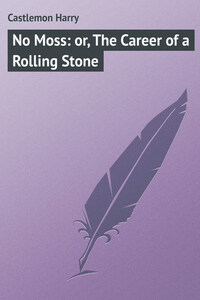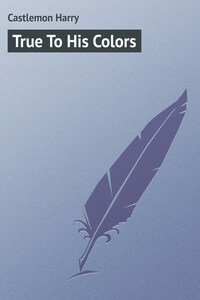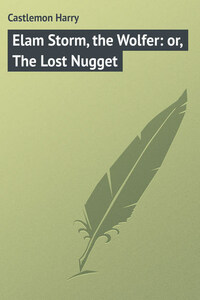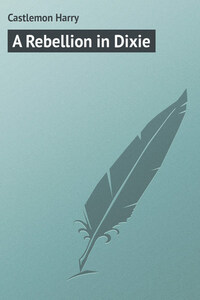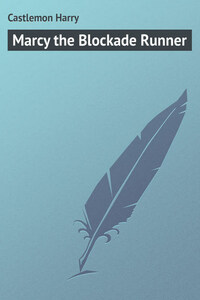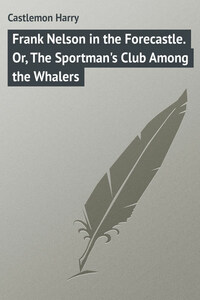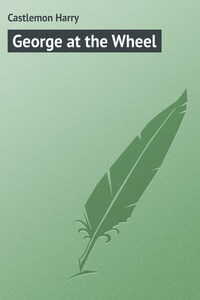"Four bells, sir!" reported the messenger-boy, to the officer who had charge of the deck of the Storm King.
"Very good. Quartermaster, make it so."
The silvery tones of the little bell rang through the vessel, and immediately there began a great noise and hubbub on the berth-deck, which, but a moment before, had been so quiet and orderly. Songs, shouts of laughter, and noises of every description, that can be made only by a lot of healthy boys just turned loose from their studies, arose through the hatchway, and presently the crew came tumbling up the ladder. The foremost held a guitar under his arm; the one that followed at his heels brought a checker-board; a third had a box of dominoes; and the boy who brought up the rear carried a single-stick in each hand, and went about challenging every one he met to a friendly trial of skill. Some of the crew walked aft to converse with their officers; the boys with the checkers and dominoes seated themselves on deck to engage in quiet games; he of the single-sticks very soon found an antagonist; and the sailor with the guitar perched himself upon the heel of the bowsprit, and, after tuning his instrument, cleared his throat, preparatory to treating his companions to a song containing the information that he had at one time "Sailed in the good ship Bessie."
The second dog-watch (the hours from six until eight in the evening) was a season of recreation with the students attached to the Storm King, and they never failed to make the most of it. A first-class boy, or an ordinary seaman, could then walk up to the executive officer and challenge him to a contest with broadswords, without committing any breach of discipline; and the first lieutenant could talk sociably with his men, with no fear of being brought before the principal and reprimanded for unofficer-like conduct. The boys played, sang, ran races through the rigging, swung Indian clubs and dumb-bells, and, of course, yelled all the while at the top of their lungs.
The Storm King had now been in possession of the principal of the academy about two months, and was every day growing in favor with the students. Indeed, the addition of a navy to the academy bid fair to cause some radical changes in the programme of studies, for military honors were at a heavy discount, and all the students were working for positions on board the yacht. No one cared for the colonel's silver eagle now, but every body cast longing eyes toward the anchors he wore in his naval shoulder-straps. The little vessel had had at least one good effect. She had put ambition into the boys, elevated the standard of scholarship, and convinced such lazy fellows as Martin, Rich, and Miller, that they must pay more attention to their books, or be left behind by every student in the academy.
The yacht was in commission now: the Stars and Stripes floated from her peak, and strict naval discipline had been established. She mounted a "Long Tom" amid-ships, in the shape of a six-pounder pivot gun; and on the berth-deck was an ample supply of small arms, consisting of cutlasses, pikes, pistols, and muskets. The crew numbered twenty boys, including captain, lieutenants, masters, midshipmen, warrant and petty officers, and seamen. They were dressed in the uniform of the United States navy; and the first lieutenant, whose whole soul was wrapped up in his duties, had drilled them until they were as handy and expert as the crew of any man-of-war.
The boys never grew tired of their work: they were passionately fond of this new branch of the service, and their efforts to perfect themselves in every department of their duties were amusing, and sometimes ridiculous. On one occasion, a frigate came into the harbor and anchored a short distance from the Storm King. Instantly the students were on the alert, for that was the time to learn something. Captain Steele ordered his executive to follow the man-of-war in striking the time of day; and this show of respect very soon attracted the attention of the commodore, who, in the afternoon, put off in his gig to visit the Storm King, where he was piped over the side, and received with all the ceremony due his rank. The students obtained liberty, visited the vessel, talked with the old tars on the streets, and the result was soon apparent: the boat's crew began to pull the regular man-of-war stroke; the seamen took to wearing their caps on the back of their heads, hitched up their trowsers with their elbows, grumbled in the most approved sailor fashion when any thing went wrong with them, and, when they walked, they rolled from side to side like vessels in a gale of wind. They remembered all the sea-phrases they heard the old tars use, and never failed to bring them in on all proper occasions. It was certainly laughable to hear a fair-haired little fellow exclaim, "Sink my tarry wig!" whenever he heard any thing that astonished him.
The boatswain's mate of the yacht made friends with the boatswain of the frigate, put himself under instructions, and soon learned to use his whistle with wonderful skill, and to issue his commands in a voice which seemed to come all the way up from his boots. And then, when he gave an order, he would hasten obedience by such expressions as – "Rouse a bit, there!" and "Make a break, now, bullies!" In short, before the frigate left the harbor, the young sailors had made great improvement in all the minor branches of their profession, and often told one another that their rivals at the academy had a good deal to learn before they could make the crew of the yacht take back seats.
